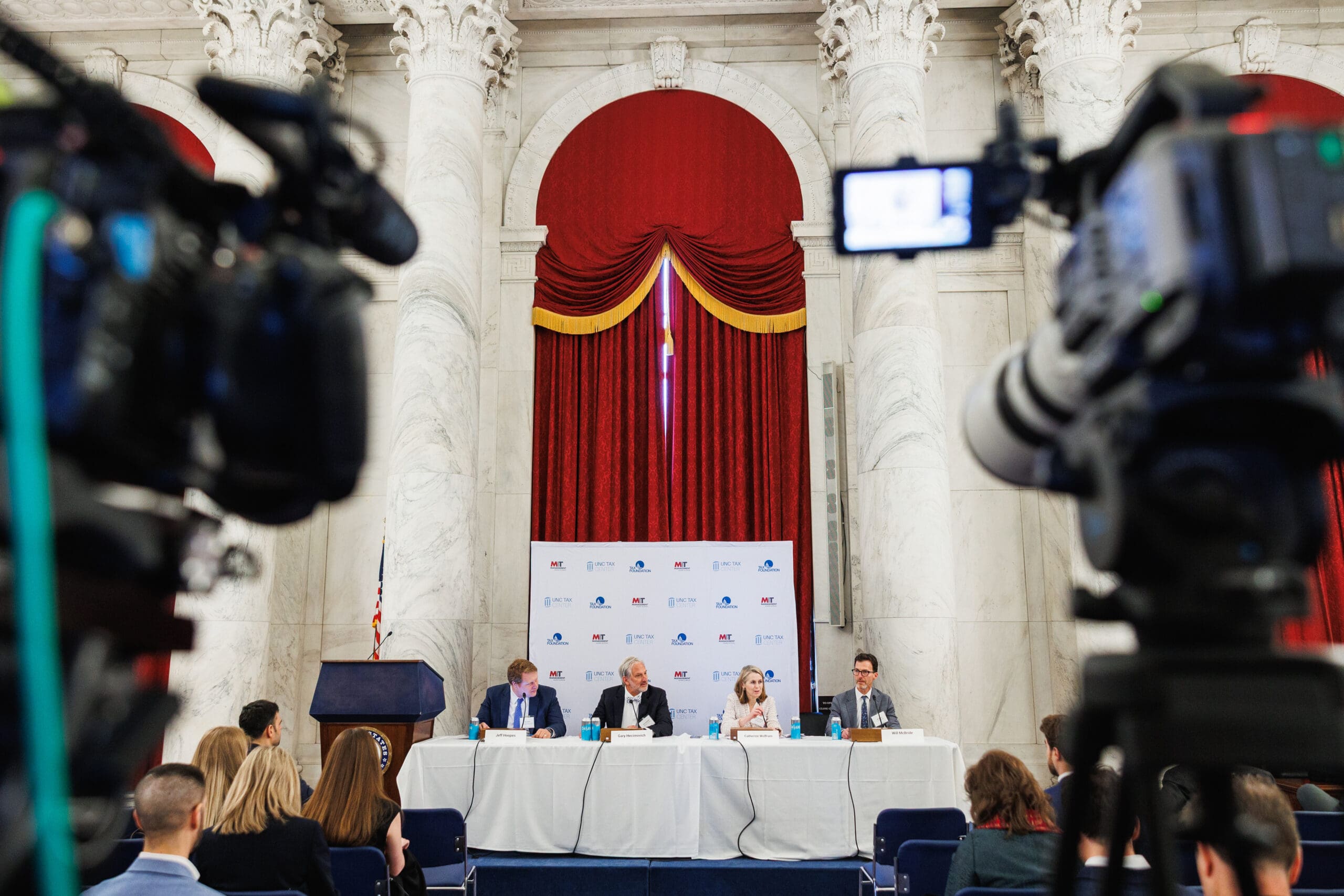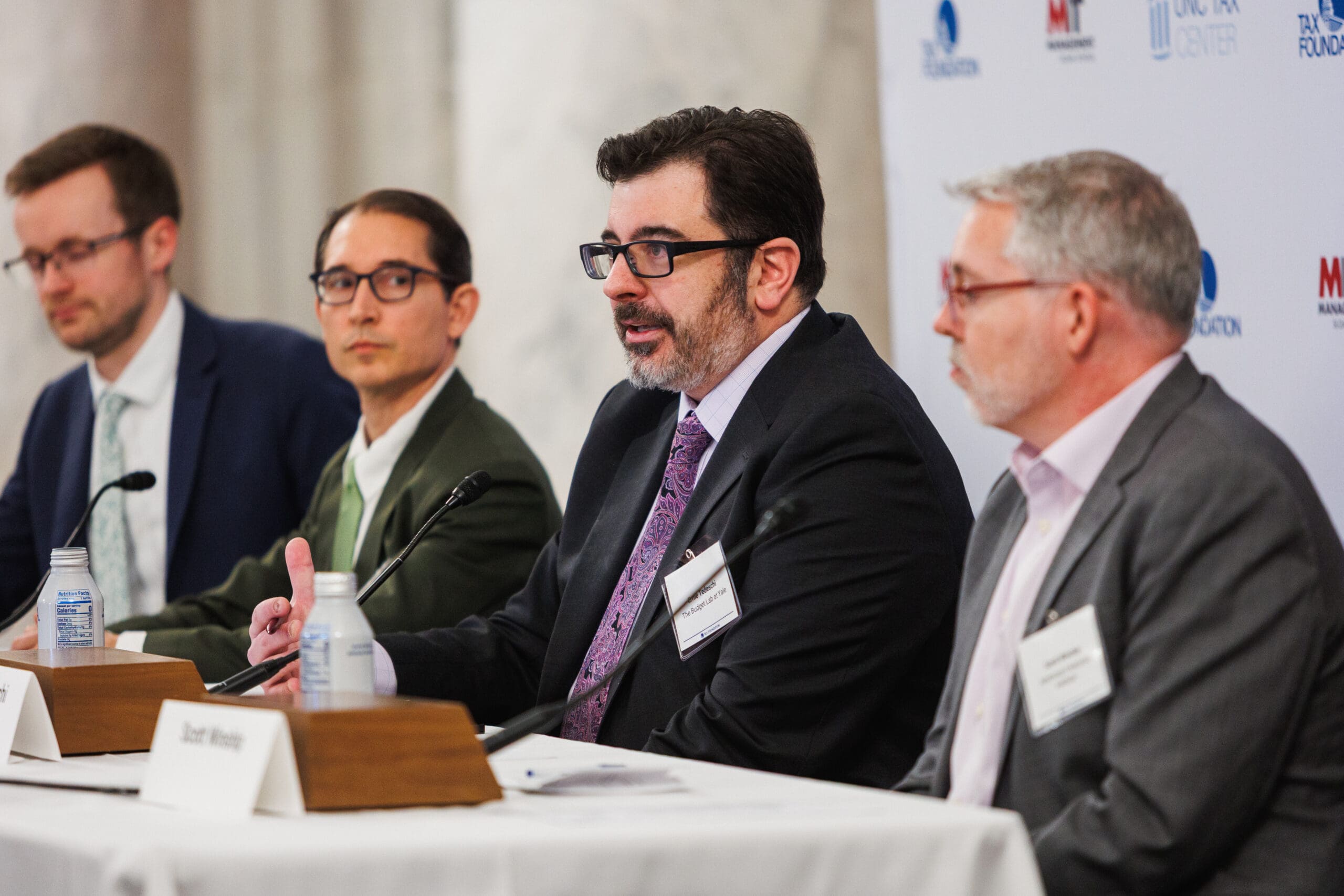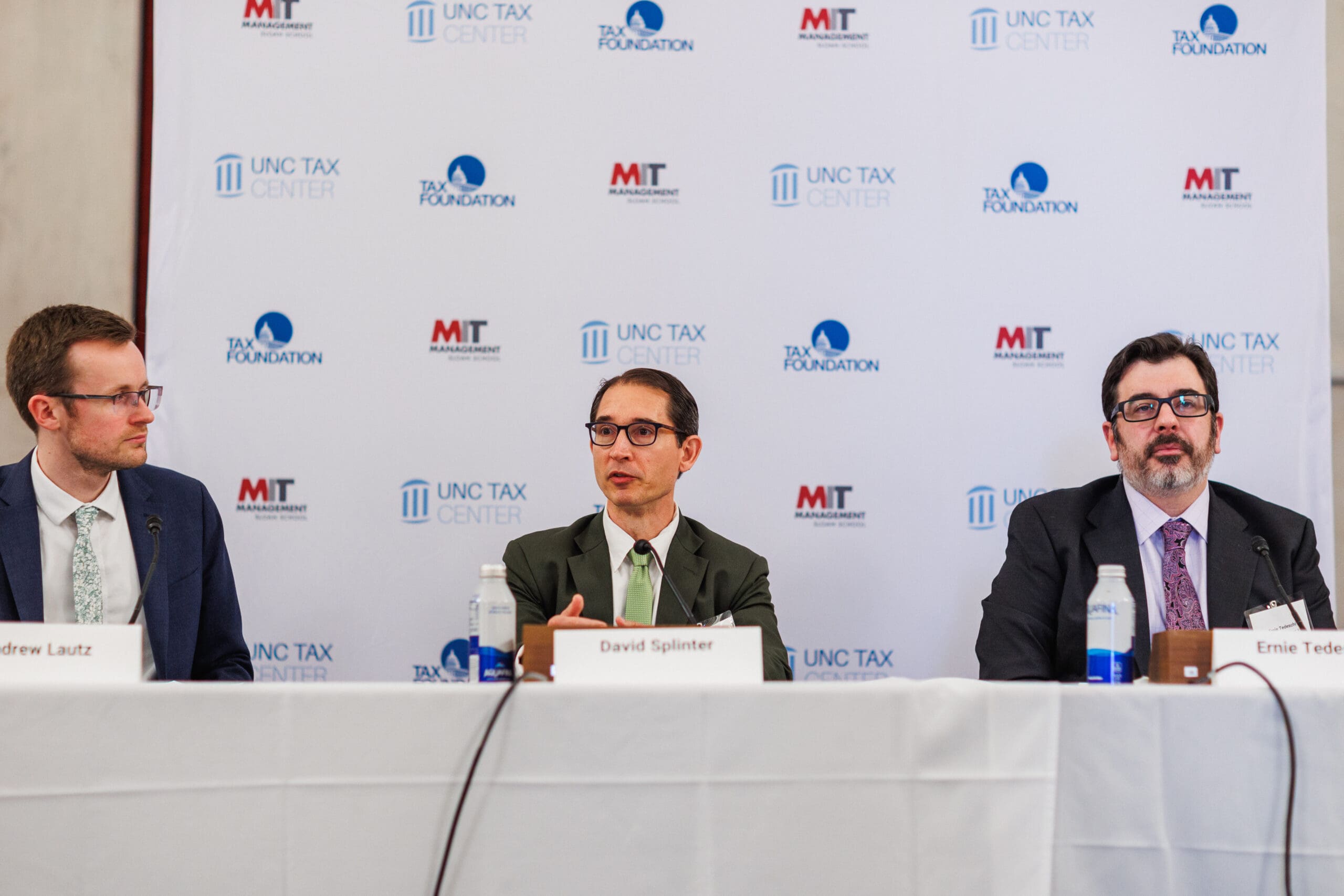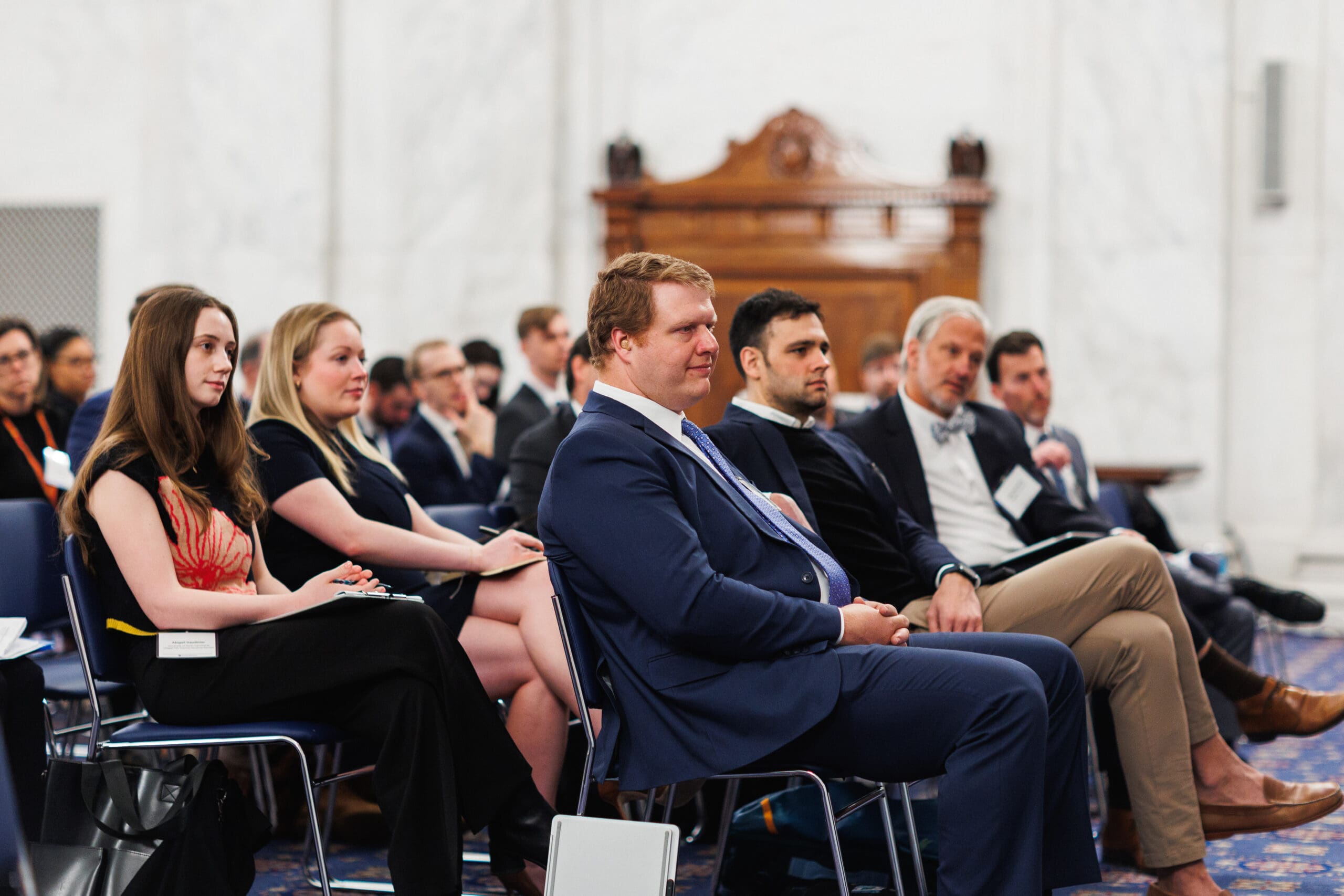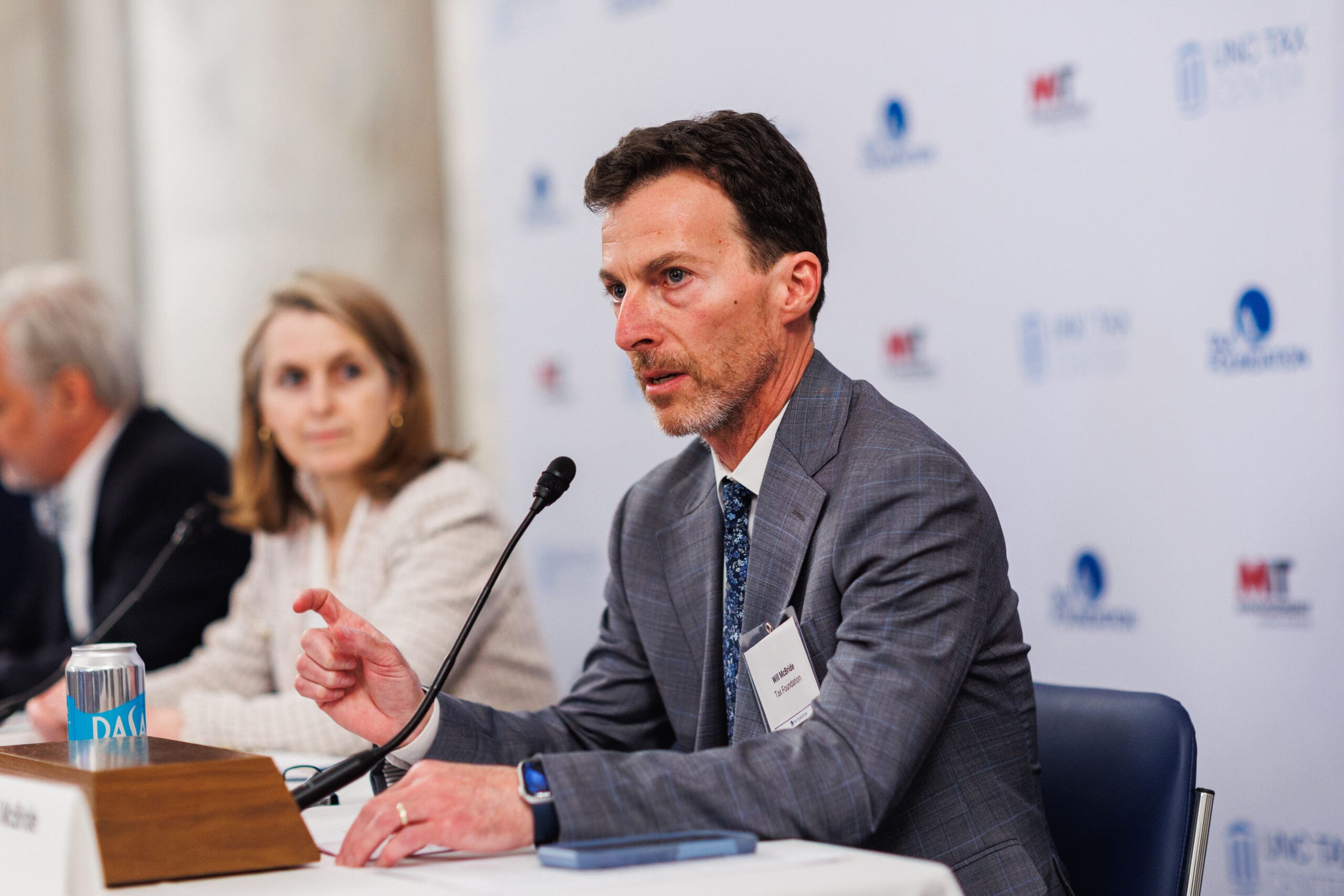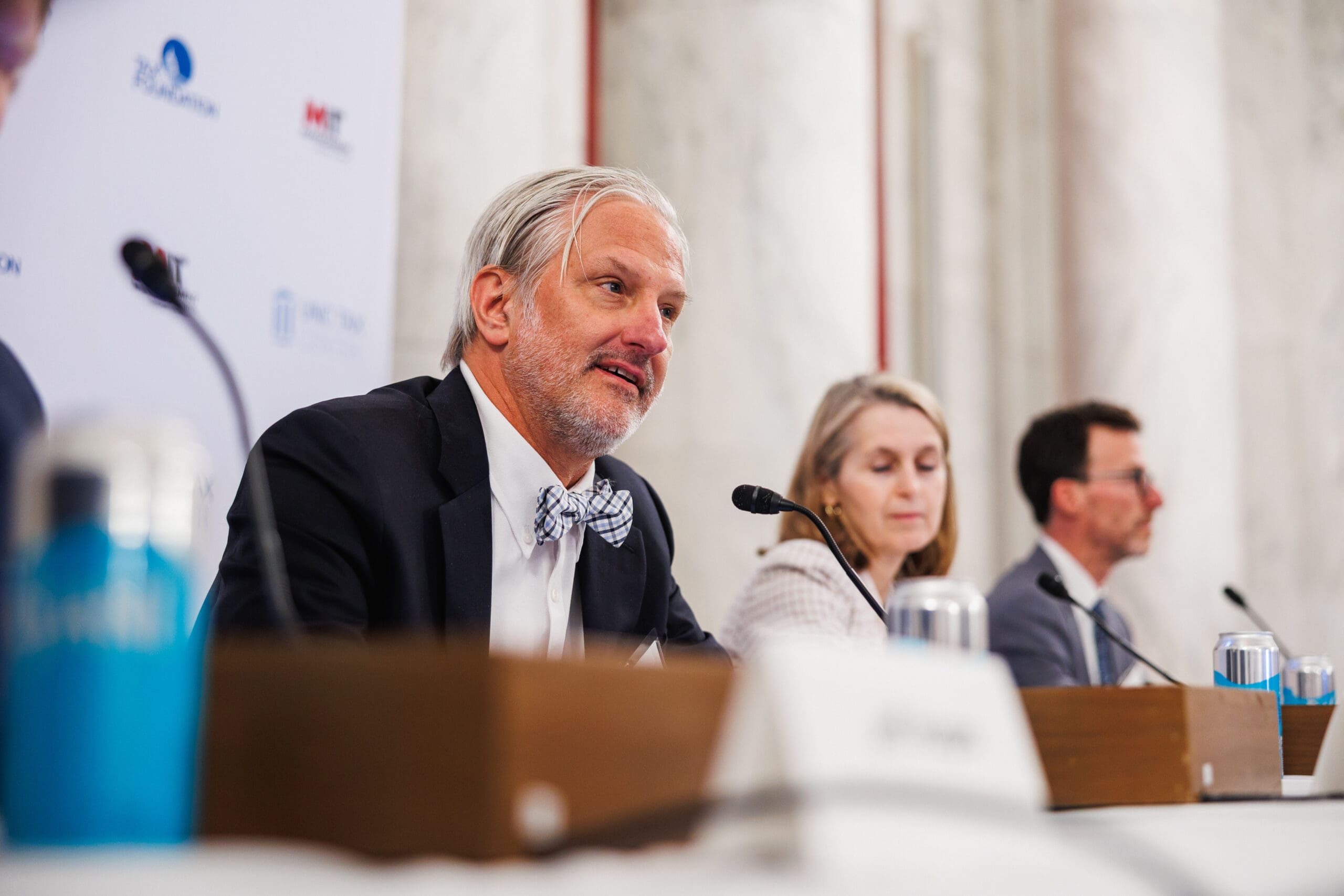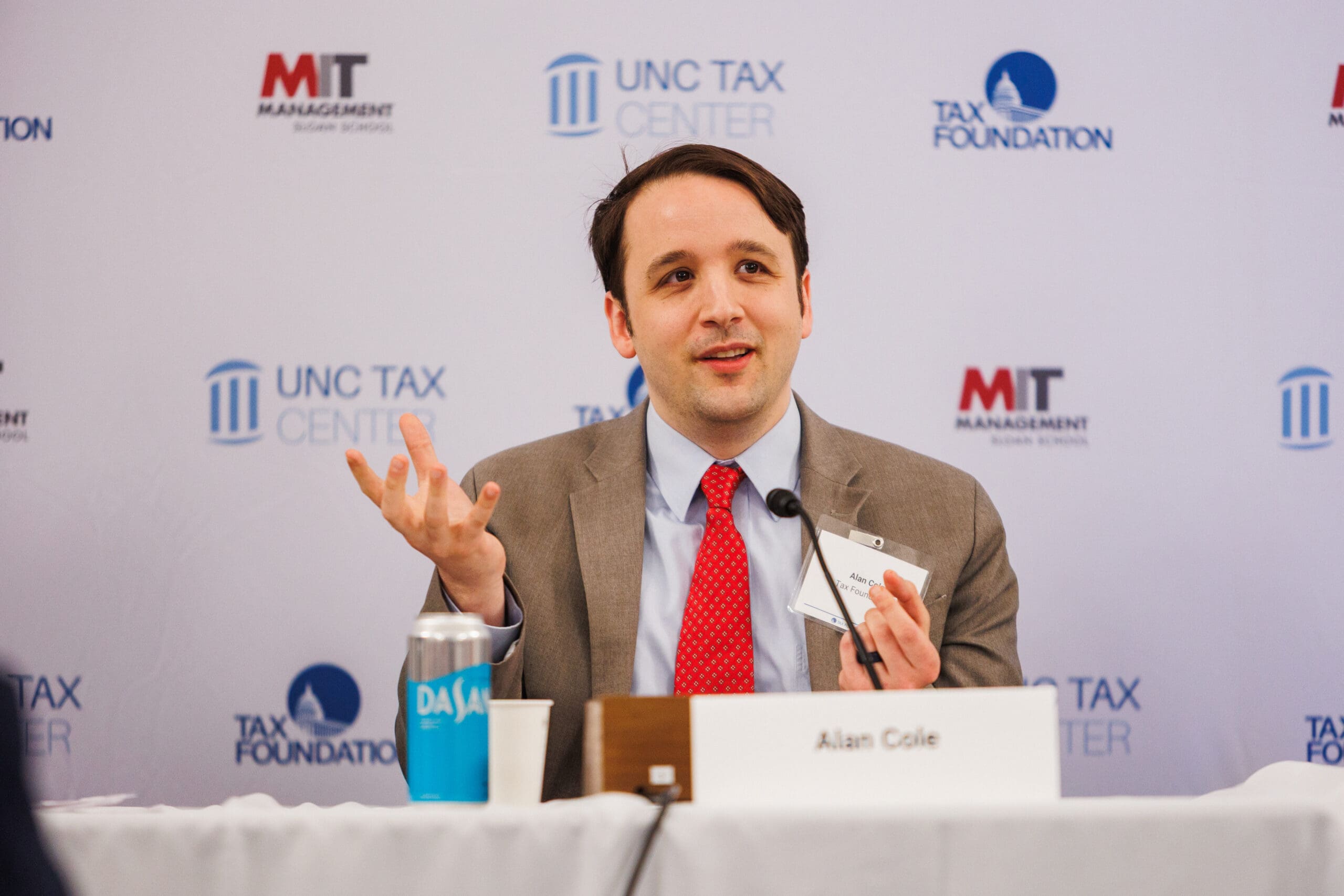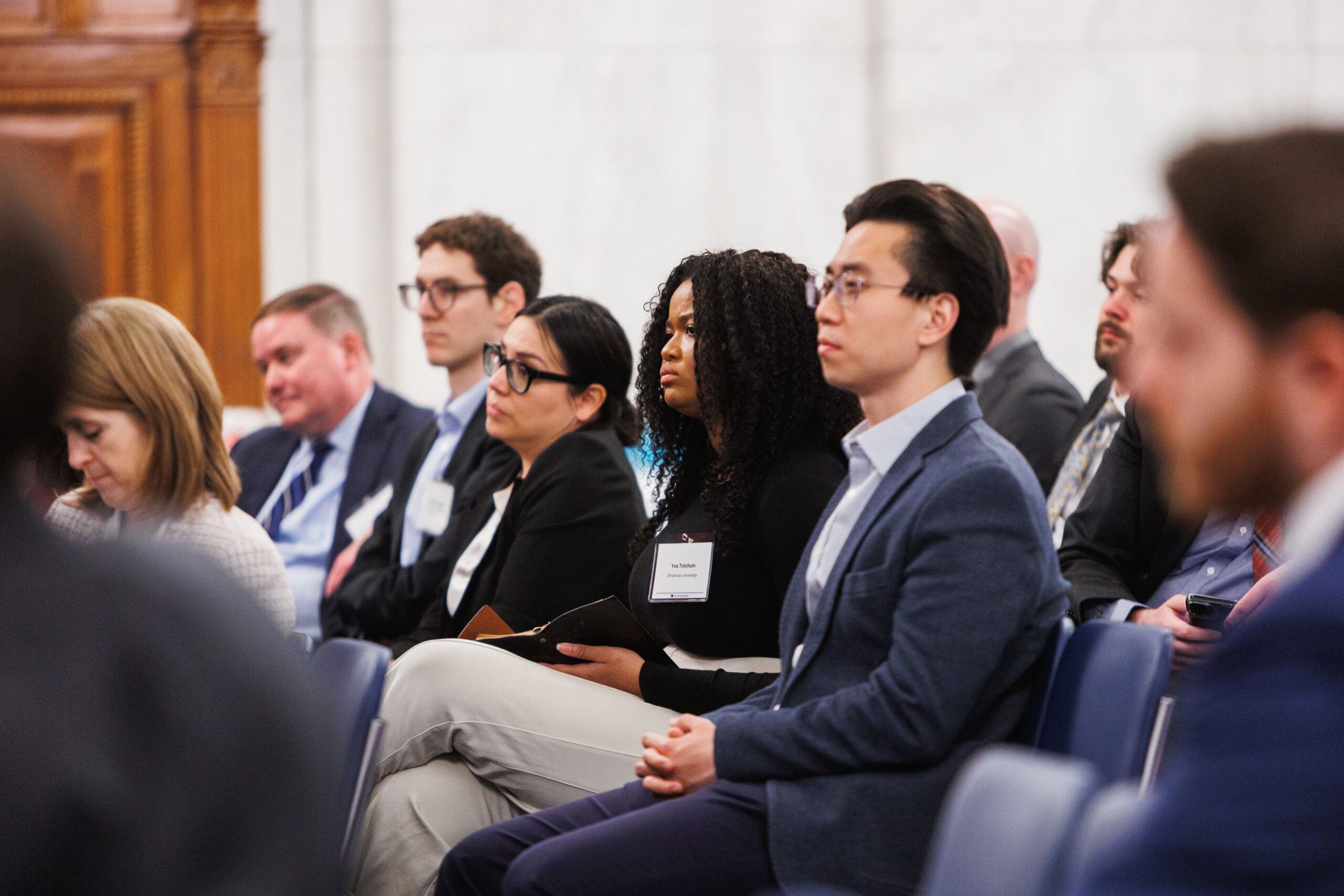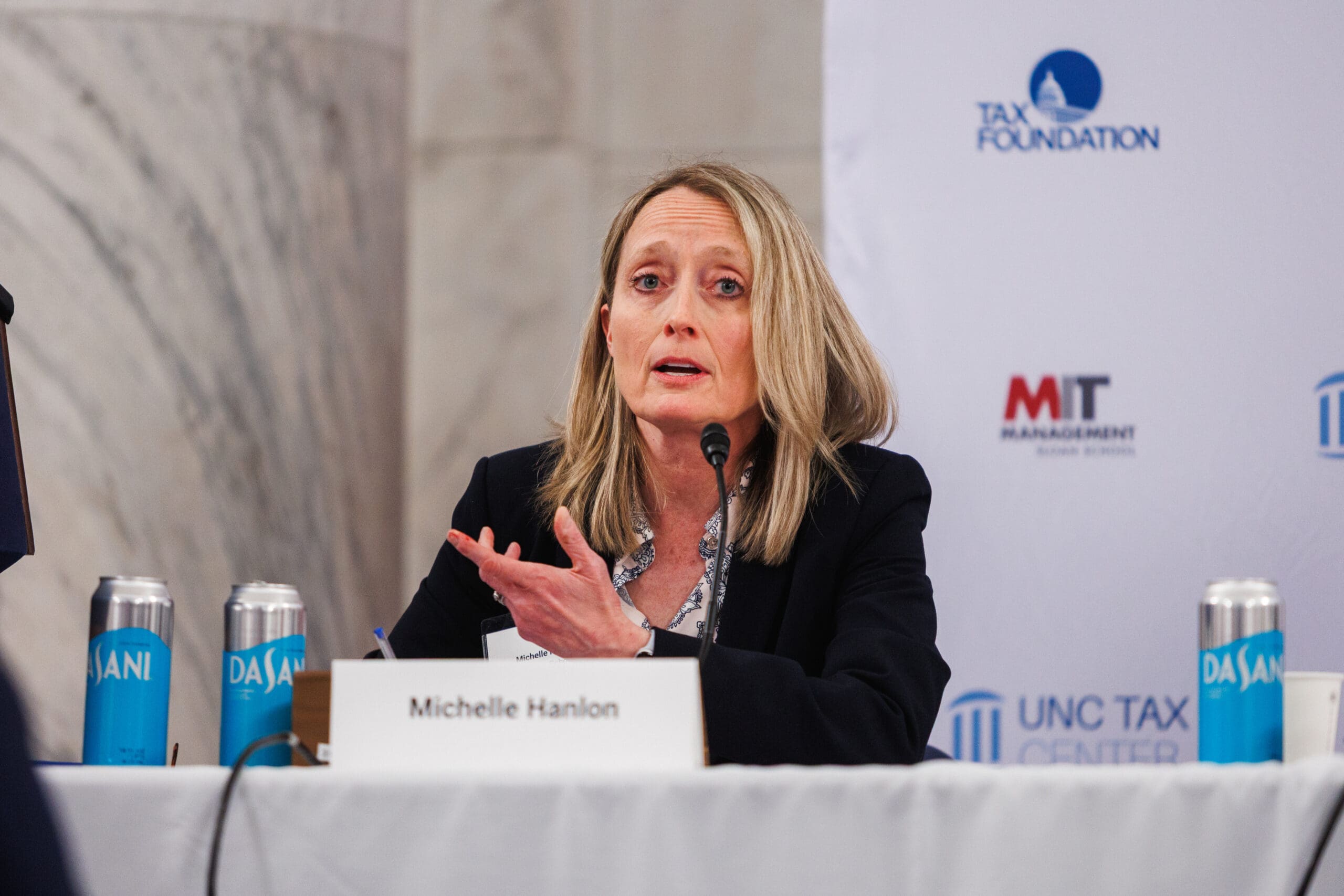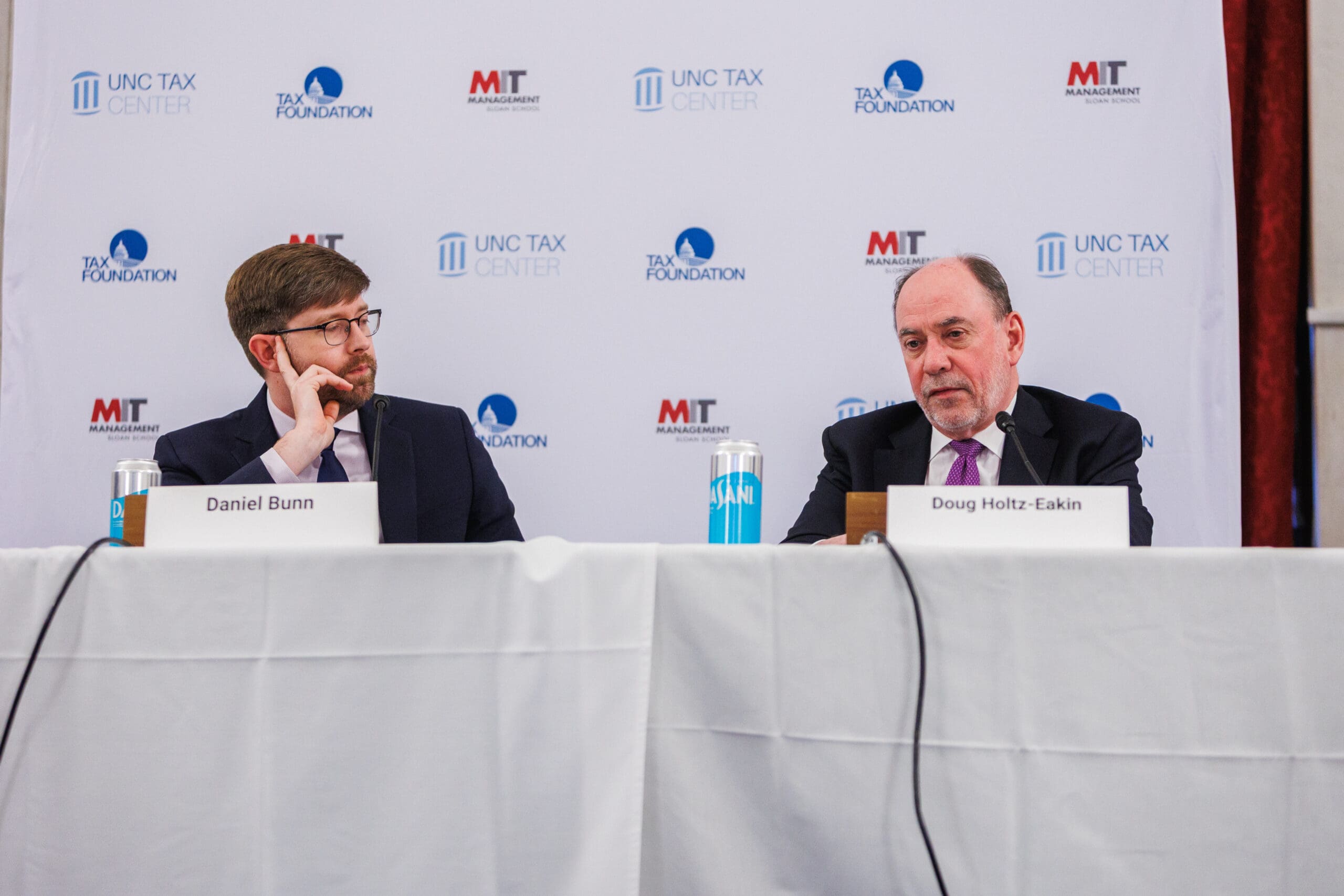Conference Overview
On Thursday, April 10th, the Tax Foundation, University of North Carolina Tax Center, and Massachusetts Institute of Technology Sloan School of Management are hosting a joint conference to discuss New Directions in Tax Policy: Budgetary and Other Challenges of an Increasingly Complex Tax Code.
This timely conference will provide members of Congress, the business community, and the American public with timely information regarding the challenges that Congress creates for itself when proposing policies with uncertain economic and budgetary impacts. With current debt and deficit levels, Congress should avoid policies that risk major costs. Recent history has shown that lawmakers have leaned into expensive policies, including major expansions of the child tax credit and renewable energy credits, without fully understanding long-run impacts. Additionally, lawmakers have implemented new business taxes, such as the corporate alternative minimum tax, that involve complex interactions between accounting and tax rules, introducing new challenges and uncertainties both for taxpayers and budget scorekeepers.
Speakers will include some of the country’s leading tax policy minds discussing these topics throughout the afternoon:
- Family Credits: Andrew Lautz of the Bipartisan Policy Center will moderate a discussion of child tax credits and other individual credits, with panelists David Splinter of the Joint Committee on Taxation (JCT), Ernie Tedeschi of the Budget Lab at Yale, and Scott Winship of the American Enterprise Institute.
- Energy Credits: Jeff Hoopes of the University of North Carolina Kenan-Flagler Business School will moderate a discussion of energy credits, with panelists Gary Hecimovich of Deloitte Tax LLP, Will McBride of the Tax Foundation, and Catherine Wolfram of the Massachusetts Institute of Technology (MIT) Sloan School of Management.
- Accounting and Business Taxation: Michelle Hanlon, also of the Sloan School of Management, will moderate a discussion of accounting and business taxation, with panelists Alan Cole of the Tax Foundation, Paul Landefeld of the JCT, and Cathy Schultz of the Business Roundtable.
Keynote: Budget Discussions: The conference will close with a networking reception featuring keynote remarks by Douglas Holtz-Eakin, President of the American Action Forum and former Director of the Congressional Budget Office (CBO).
Event Photos
See More Event Photos
Stay Informed on Upcoming Events.
Get exclusive invites to virtual and in-person panel discussions, debates, and lectures, featuring today’s leading tax and economic experts.
Sign UpFeatured Speakers
 Alan Cole is a Senior Economist with Tax Foundation’s Center for Federal Tax Policy. His areas of focus include business taxes, cross-border taxes, and macroeconomics.
Alan Cole is a Senior Economist with Tax Foundation’s Center for Federal Tax Policy. His areas of focus include business taxes, cross-border taxes, and macroeconomics.
In addition to work at Tax Foundation, Alan Cole has served on the Joint Economic Committee and with The Conference Board, and published on a variety of economic topics. Alan has a bachelor’s degree in economics from Yale University and an MBA majoring in finance and public policy from the Wharton School. Alan lives in Washington, D.C., with his wife and daughter.
 Andrew Lautz is an Associate Director for BPC’s Economic Policy Program, where he helps lead BPC’s federal tax policy portfolio. In this role, Lautz conducts research, develops policy recommendations, and engages with lawmakers and stakeholders on a variety of tax issues, from the Child Tax Credit to international tax reform. His insights on tax policy have been featured in The New York Times, The Wall Street Journal, The Washington Post, and Bloomberg, among other major publications. Previously, he was the Director of Federal Policy for National Taxpayers Union (NTU) and NTU Foundation. Lautz holds a B.A. in political communication and an M.P.S. in political management from The George Washington University.
Andrew Lautz is an Associate Director for BPC’s Economic Policy Program, where he helps lead BPC’s federal tax policy portfolio. In this role, Lautz conducts research, develops policy recommendations, and engages with lawmakers and stakeholders on a variety of tax issues, from the Child Tax Credit to international tax reform. His insights on tax policy have been featured in The New York Times, The Wall Street Journal, The Washington Post, and Bloomberg, among other major publications. Previously, he was the Director of Federal Policy for National Taxpayers Union (NTU) and NTU Foundation. Lautz holds a B.A. in political communication and an M.P.S. in political management from The George Washington University.
 Catherine Schultz is Vice President, Tax and Fiscal Policy for the Business Roundtable, where she is responsible for tax and advocacy efforts that promote U.S. economic growth, competitiveness and job creation.
Catherine Schultz is Vice President, Tax and Fiscal Policy for the Business Roundtable, where she is responsible for tax and advocacy efforts that promote U.S. economic growth, competitiveness and job creation.
Before joining the Business Roundtable, Catherine was the Vice President for Tax Policy at the National Foreign Trade Council for almost 15 years. She was deeply involved in the OECD work on the Base Erosion and Profit Shifting (BEPS) Project, and the work on the taxation of the digital economy. She is a U.S. representative to the OECD on the WP9 Technical Advisory Group on the taxation of cross-border services under the VAT.
A native of Pittsburgh, Pennsylvania, Catherine earned her bachelor’s degree from the Pennsylvania State University, studied economics at the University of Exeter, England, and attended graduate school at the University of Pennsylvania.
 Catherine Wolfram is the William Barton Rogers Professor of Energy Economics at the MIT Sloan School of Management. She previously served as the Cora Jane Flood Professor of Business Administration at the Haas School of Business at UC Berkeley. From March 2021 to October 2022, she served as the Deputy Assistant Secretary for Climate and Energy Economics at the U.S. Treasury, while on leave from UC Berkeley. Before leaving for government service, she was the Program Director of the National Bureau of Economic Research's Environment and Energy Economics Program and a research affiliate at the Energy Institute at Haas. Before joining the faculty at UC Berkeley, she was an Assistant Professor of Economics at Harvard. Wolfram has published extensively on the economics of energy markets. Her work has analyzed rural electrification programs in the developing world, energy efficiency programs in the US, the effects of environmental regulation on energy markets and the impact of privatization and market restructuring in the US and UK. She is currently working on projects at the intersection of climate, energy, and trade, including work on oil market sanctions. She received a PhD in Economics from MIT in 1996 and an AB from Harvard in 198
Catherine Wolfram is the William Barton Rogers Professor of Energy Economics at the MIT Sloan School of Management. She previously served as the Cora Jane Flood Professor of Business Administration at the Haas School of Business at UC Berkeley. From March 2021 to October 2022, she served as the Deputy Assistant Secretary for Climate and Energy Economics at the U.S. Treasury, while on leave from UC Berkeley. Before leaving for government service, she was the Program Director of the National Bureau of Economic Research's Environment and Energy Economics Program and a research affiliate at the Energy Institute at Haas. Before joining the faculty at UC Berkeley, she was an Assistant Professor of Economics at Harvard. Wolfram has published extensively on the economics of energy markets. Her work has analyzed rural electrification programs in the developing world, energy efficiency programs in the US, the effects of environmental regulation on energy markets and the impact of privatization and market restructuring in the US and UK. She is currently working on projects at the intersection of climate, energy, and trade, including work on oil market sanctions. She received a PhD in Economics from MIT in 1996 and an AB from Harvard in 198
 Daniel Bunn is President and CEO of the Tax Foundation. Daniel has been with the organization since 2018 and, prior to becoming President, successfully built its Center for Global Tax Policy, expanding the Tax Foundation’s reach and impact around the world.
Daniel Bunn is President and CEO of the Tax Foundation. Daniel has been with the organization since 2018 and, prior to becoming President, successfully built its Center for Global Tax Policy, expanding the Tax Foundation’s reach and impact around the world.
Prior to joining the Tax Foundation, Daniel worked in the United States Senate at the Joint Economic Committee as part of Senator Mike Lee’s (R-UT) Social Capital Project and on the policy staff for both Senator Lee and Senator Tim Scott (R-SC). In his time in the Senate, Daniel developed legislative initiatives on tax, trade, regulatory, and budget policy.
He has a master’s degree in Economic Policy from Central European University in Budapest, Hungary, and a bachelor’s degree in Business Administration from North Greenville University in South Carolina.
Daniel lives in Halethorpe, Maryland, with his wife and their three children.
 Ernie Tedeschi is the Director of Economics at the Budget Lab at Yale and a Visiting Fellow at the Psaros Center for Financial Markets and Policy at Georgetown University. He’s also a Bloomberg Opinion columnist. Until March 2024, Ernie was the Chief Economist at the White House Council of Economic Advisers. Prior to CEA, he was Managing Director and Head of Fiscal Analysis at Evercore ISI, a macro advisory firm. He was also previously an economist at the U.S. Department of the Treasury. Ernie completed his undergraduate studies at Stanford University and graduate work at the University of California at Berkeley.
Ernie Tedeschi is the Director of Economics at the Budget Lab at Yale and a Visiting Fellow at the Psaros Center for Financial Markets and Policy at Georgetown University. He’s also a Bloomberg Opinion columnist. Until March 2024, Ernie was the Chief Economist at the White House Council of Economic Advisers. Prior to CEA, he was Managing Director and Head of Fiscal Analysis at Evercore ISI, a macro advisory firm. He was also previously an economist at the U.S. Department of the Treasury. Ernie completed his undergraduate studies at Stanford University and graduate work at the University of California at Berkeley.
 Gary Hecimovich is a partner in the Washington National Tax Office (“WNT”) of Deloitte Tax LLP. He is a member of the firm’s Credits and Incentives Group and has more than 33 years of public accounting experience specializing in federal income tax credits and incentives and related accounting method issues. Gary and his team provide due diligence, structuring (tax equity, transfers, direct pay), tax opinions, tax controversy, private ruling requests, application writing and transactional consulting with respect to a wide array of federal income tax incentives including Energy Tax Credits, Renewable Energy Production Tax Credits, Advanced Manufacturing Production Credits, Qualifying Advanced Energy Project Credits, Advanced Manufacturing Investment Credits, Qualified Commercial Clean Vehicles, Employee Retention Credits, Qualified Opportunity Zones, New Markets Tax Credits, Historic Rehabilitation Tax Credits, and various other incentives.
Gary Hecimovich is a partner in the Washington National Tax Office (“WNT”) of Deloitte Tax LLP. He is a member of the firm’s Credits and Incentives Group and has more than 33 years of public accounting experience specializing in federal income tax credits and incentives and related accounting method issues. Gary and his team provide due diligence, structuring (tax equity, transfers, direct pay), tax opinions, tax controversy, private ruling requests, application writing and transactional consulting with respect to a wide array of federal income tax incentives including Energy Tax Credits, Renewable Energy Production Tax Credits, Advanced Manufacturing Production Credits, Qualifying Advanced Energy Project Credits, Advanced Manufacturing Investment Credits, Qualified Commercial Clean Vehicles, Employee Retention Credits, Qualified Opportunity Zones, New Markets Tax Credits, Historic Rehabilitation Tax Credits, and various other incentives.
Gary is a frequent public speaker and published author on federal tax matters. His articles have appeared in Tax Notes, Journal of Accountancy, and the Tax Advisor. Gary previously served as the moderator of the firm’s Federal Tax Dbrief webcast series. He is a graduate of the University of North Carolina at Chapel Hill and is a member of the UNC Tax Center Leadership Council.
 Jeff is Research Director of the University of North Carolina Tax Center and Professor of Accounting.
Jeff is Research Director of the University of North Carolina Tax Center and Professor of Accounting.
Jeff studies how taxpayers respond to tax laws and changes in tax enforcement. He examines issues at the intersection of accounting, public economics and finance. He has expertise in both corporate and individual taxation as well as tax administration and compliance.
He teaches classes that deal with taxes and business strategy, and how tax policy affects taxpayer decisions and the economy.
Dr. Hoopes’ research has been published in the Journal of Accounting and Economics, Journal of Financial Economics, Journal of Law and Economics, Journal of Public Economics, The Accounting Review, Journal of Accounting Research, Management Science, xmv American Economic Journal: Economic Policy and National Tax Journal.
He serves as the research director of the UNC Tax Center.
He regularly interacts with the research analysis and statistics division of the Internal Revenue Service on ongoing joint research projects and is a CPA with an active license in the state of Colorado.
Dr. Hoopes is frequently mentioned in the national media. His work or comments have been cited by NPR, The New York Times, The Wall Street Journal, National Affairs, The Washington Post, The Atlantic, Time, Fortune, Christian Science Monitor, Forbes, Fox Business, Bloomberg Businessweek, Tax Notes, USA Today, CFO.com, and Reuters, among other outlets.
He received his PhD in business administration from the University of Michigan. He received his MAcc with a tax emphasis from Brigham Young University, where he also graduated with a BS in accounting.
 Michelle Hanlon is the Howard W. Johnson Professor and a Professor of Accounting at the MIT Sloan School of Management
Michelle Hanlon is the Howard W. Johnson Professor and a Professor of Accounting at the MIT Sloan School of Management
Hanlon teaches a course on taxes and business strategy and she also often teaches an introductory financial accounting course. Her research focuses primarily on the intersection of taxation and financial accounting. Hanlon’s recent work examines the capital market and reputational effects of corporate tax avoidance, the economic consequences of U.S. international tax policies for multinational corporations, the effect of individual-level taxes on corporate payout policy, and the extent of individual-level offshore tax evasion. She is an editor at one of the leading accounting research journals. She has won several awards for her research and is the winner of the 2013 Jamieson Prize for Excellence in Teaching at Sloan.
Hanlon has testified in front of the U.S. Senate Committee on Finance and the U.S. House of Representatives Committee on Ways and Means regarding U.S. tax policy. She recently worked as an Academic Fellow for the U.S. House Ways and Means (majority) tax staff.
Professor Hanlon holds a BBA from Eastern Illinois University, an MAcc in taxation from the University of Missouri-St. Louis, and a PhD in accounting from the University of Washington.
Paul Landefeld is a Senior Economist at the Joint Committee on Taxation, where he focuses on issues relating to corporate and international tax. His work has been published in scholarly economics journals such as the Journal of Public Economics and National Tax Journal. Prior to completing graduate studies, he held positions at the Federal Reserve Board of Governors and the Council of Economic Advisers. Dr. Landefeld earned a Ph.D. in Economics from the University of Virginia and a B.A. in Economics from Columbia University.
 Scott Winship is a senior fellow and the director of the Center on Opportunity and Social Mobility at the American Enterprise Institute (AEI), where he researches safety net policy, poverty, economic mobility, and social capital.
Scott Winship is a senior fellow and the director of the Center on Opportunity and Social Mobility at the American Enterprise Institute (AEI), where he researches safety net policy, poverty, economic mobility, and social capital.
Before joining AEI, Winship served as the executive director of the Joint Economic Committee (JEC). During his time at the JEC, under Chairman Mike Lee (R-UT), Winship created the Social Capital Project, a multiyear research project to investigate the evolving nature of social relationships including families, communities, workplaces, and religious congregations.
Winship has a PhD in social policy and an MA in sociology from Harvard University. He holds a BA in sociology and urban studies from Northwestern University.
Dr. William McBride is the Chief Economist & Stephen J. Entin Fellow in Economics at the Tax Foundation, where he oversees major research projects primarily related to reforming the federal tax code, advancing sound tax policy, and improving the federal government’s fiscal outlook.
Dr. McBride has more than ten years of experience analyzing a variety of economic and policy issues. At the Tax Foundation he has served as the Vice President of Federal Tax Policy, leading our efforts to research, model, and reform the U.S. tax code, and as Chief Economist, researching the economics of taxation and guiding the development of the Tax Foundation dynamic scoring model. From 2015 to 2020 he was a manager in the National Economic and Statistics (NES) group at PwC where he worked on a wide array of projects including economic impact analyses, industry surveys, U.S. federal and state tax revenue estimates, and issues related to tax reform at the state, federal, and international levels.
Dr. McBride holds a PhD in economics from George Mason University, where he specialized in macroeconomics and agent-based modeling. His research has been cited by policymakers, quoted by major media outlets, including The Wall Street Journal and The New York Times, and published in scholarly journals, such as the National Tax Journal, Public Budgeting & Finance, and Tax Notes.
Agenda
2:45 – 3:00 p.m.
Arrivals and registration
3:00 – 3:10 p.m.
Welcome remarks
- Speaker: Daniel Bunn, Tax Foundation
3:10 – 3:55 p.m.
Family Credits
- Moderator: Andrew Lautz, Bipartisan Policy Center
- Speakers: David Splinter, Joint Committee on Taxation, Ernie Tedeschi, The Budget Lab at Yale, Scott Winship, American Enterprise Institute
3:55 – 4:10 p.m.
Break
4:10 – 4:55 p.m.
Energy Credits
- Moderator: Jeff Hoopes, University of North Carolina Kenan-Flagler Business School
- Speakers: Gary Hecimovich, Deloitte Tax LLP, Will McBride, Tax Foundation, Catherine Wolfram, MIT Sloan School of Management
4:55 – 5:10 p.m.
Break
5:10 – 5:55 p.m.
Accounting and Business Taxation
- Moderator: Michelle Hanlon, MIT Sloan School of Business
- Speakers: Alan Cole, Tax Foundation, Paul Landefeld, Joint Committee on Taxation, Cathy Schultz, Business Roundtable
5:55 – 7:00 p.m.
Reception
6:30 – 6:50 p.m.
Keynote Address - How does all of the above affect the budget discussions?
- Speaker: Doug Holtz-Eakin, American Action Forum
7:00 p.m.
Adjourn
Stay informed on the tax policies impacting you.
Subscribe to get insights from our trusted experts delivered straight to your inbox.
Subscribe